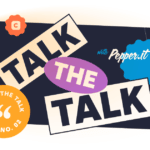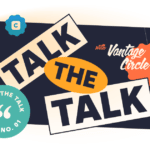Strong Rapport in 90 Seconds, Part 2: Use These Small Talk Frameworks to Sell 6.6x More

We only get one chance to make a first impression. What a cliché, right? Well, it’s a cliché for a reason.
As you know from part 1 of our small talk series, when talking to a prospect or customer, your reps have around 90 seconds to build a strong rapport, and as little as 7 seconds to gain their sympathy.
There’s nothing better for that than small talk – something so simple you may wonder why someone would bother to write a blog about it.
Well, we have written this article because it’s not so simple. Small talk can be a BIG problem.
You’re probably imagining something like “What’s the weather like in Spain?” (surprise, it’s hot…), but that’ll only categorize your rep as “another salesperson”.
Why?
Nick Cegelski, the founder of 30 Minutes to President’s Club, nicely explains this in his LinkedIn post:
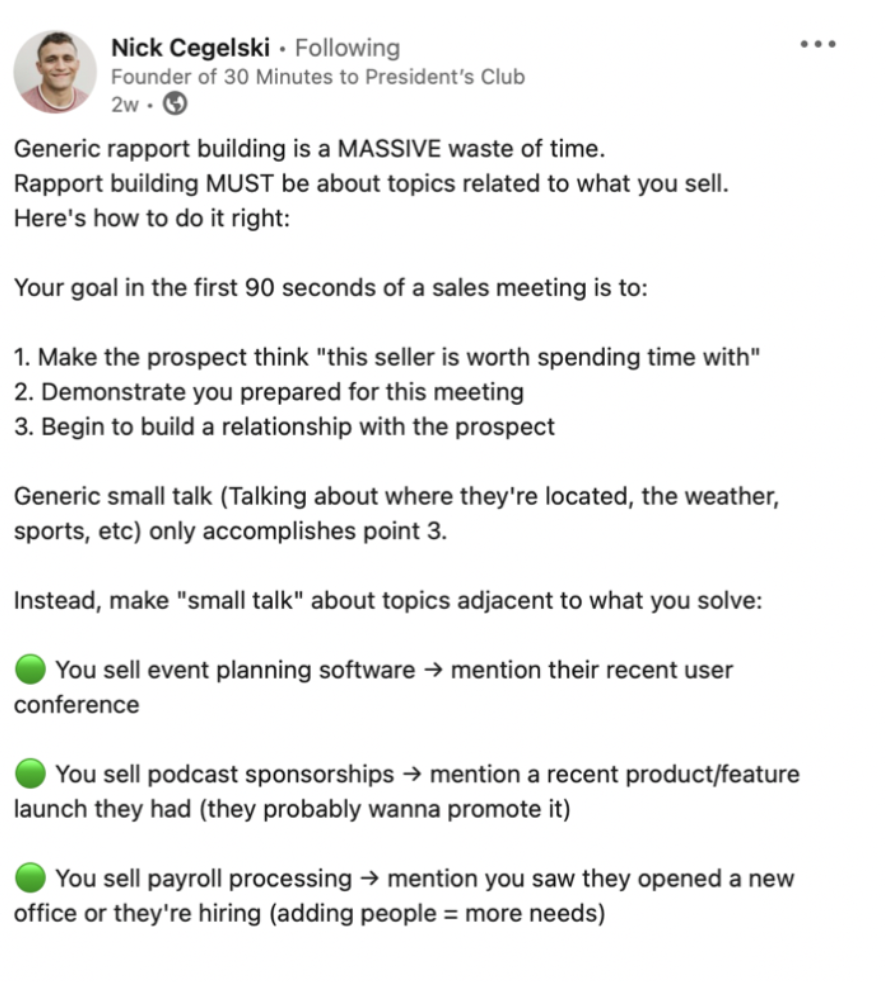
Now, you may be wondering, “How do I teach the right small talk strategy to my reps?”. We’re glad you asked!
You’ll find your answers below. ⬇️
4 Sales Small-talk Frameworks No One Talks About
Richard Wiessbourd, a noted Harvard psychologist, described small talk as a social lubricant that evokes empathy and creates a sense that we are all in this together. He claims that small talk humanizes us and builds a comfort zone.
Now, let’s take a look at a few (mostly) scientific small-talk strategies that ensure strong rapport with prospects:
1. “The Spark, The Flow, The Respect” Method For Introverts In Sales
A Salesforce survey showed that 79% of consumers think it’s extremely important for salespeople to be trusted advisors. This framework teaches just that – how to master reps’ charisma – even if they are complete introverts!
In the first 90 seconds, prospects judge the rep’s intention. Are they trustworthy? Are they too pushy? That all depends not only on what they say but also on how they say it.
Let’s go through a 3 steps to master a sincere small talk:
a. Don’t Burn The House, Ignite the Spark
The spark refers to an opening sentence – those 7 crucial seconds in making a strong first impression.
Under this kind of pressure, it’s a natural human tendency to overthink. We want to sound clever but not arrogant. Funny but not cringy. Professional but not boring. And as reps try to fit all this into a single sentence, it often comes out awkwardly.
Let’s use copywriting as an example, specifically the Headline Writing Principle. The goal of a good headline isn’t to tell readers everything immediately. The only purpose is to get them hooked. Motivate them to read the first paragraph and, hopefully, go through the whole article.
Similarly, with an opening line, the sales rep wants to compel the prospect to talk, so they can start the conversation smoothly. In other words, salespeople should try to ignite a spark, not burn the house down.
Examples of “spark” questions:
- “So, Jane, I saw you studied in Paris. What’s your favorite place to go?”
- “I saw you became a team lead for an XY project, John. That’s exciting. How is it going so far?”
These questions aren’t really complete, though.
Let’s look at how “the flow” principle can make them much better.
b. Ask Questions That Flow
By now, it’s clear that reps should ask simple yet meaningful questions. But as we mentioned before, the same or perhaps even more important is how they ask those questions.
After all, the point of asking a question is not only to get an answer but to get an answer that sparks the flow of conversation.
Reps should always ask open, specific questions that somehow tie them to the story. It feels much more personal when the prospect knows the agent can relate to them or they have firm ground to discuss what they both know.
Examples of spark questions with the flow principle applied:
- “So, Jane, I saw you studied in Paris. I go there every year, and I love to visit XY. What’s your favorite place?”
- “I saw you became a team lead for an XY project, John. We were actually trying something similar last quarter. How is it working for you so far?”
c. Build Respect With Subtle Praise
After the rep caught the prospect’s attention, it’s time to build the foundation for mutual appreciation. And despite what you may think, 90 seconds is plenty of time to do that.
All the agent needs to do to build respect is give a compliment. However, they have to be very mindful of what compliments they choose. Saying, “You have beautiful blue eyes,” would just create an awkward situation.
Exaggerated, pompous compliments also make us sound insincere. That’s one of the worst things for a seller.
The magic of compliments is that they can be so subtle that they feel like a natural part of the conversation but still evoke a warm and fluffy feeling in the receiver. However, they have to be specific to work.
What can the right compliment be, then?
People like to be appreciated for their achievements. It feels more meaningful to praise someone’s success rather than, let’s say, their scarf. They bought that scarf. They have nothing to do with its appearance (unless they made it themselves, but reps cannot know that).
On the other hand, prospects surely put a lot of effort into their success. It’s flattering when someone notices.
Example of an effective complement:
“I saw you speaking at that sales conference, Jane. You seemed so confident. What’s your secret?”
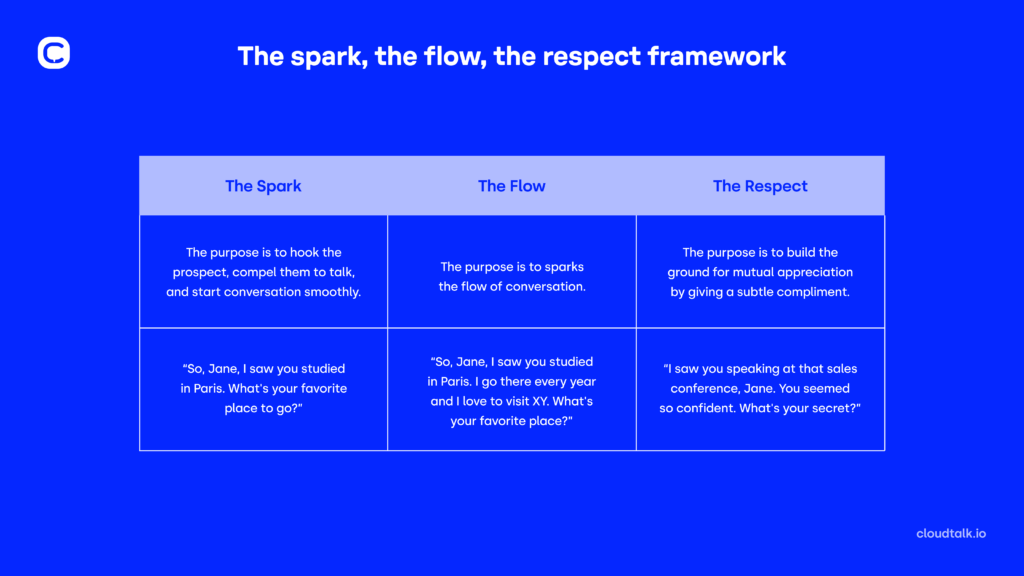
Interesting fact: Small talk makes us more organized!
A study published in the Social Psychology and Personality Science Journal called “Friends (And Sometimes Enemies) With Cognitive Benefits” (we hope that our titles are at least half as cool as this one…) shows that brief, casual interactions like small talk boost our brain’s executive functions. These are mental processes that are responsible for focusing, planning, prioritizing, and organizing.
2. Horizontal Vs. Vertical Questioning: Build Deeper Understanding
Small talk, such as any human interaction, is essentially just applied psychology.
In her blog, PhD Janice Webb, a psychologist, speaker, and best selling author, introduces a method for creating deeper connections via layered questioning.
Since the theory around this framework may get quite abstract, let’s see an example before digging deeper into it:
Horizontal question: “Did you play football in high school?”
Vertical question: “What was your role in the team?”
Horizontal Questions: Peek Into Prospect’s Inner World
Horizontal questions initiate the small talk and they go before vertical questions.
They uncover information that leads to the main topic. The answer to horizontal questions is usually brief and doesn’t leave much room for discussion. It’s often closed questions, with a “yes” or “no” answer.
You may be asking why to use horizontal questions in the first place. Closed questions are a no-no in sales, each rep knows that. So, aren’t they wasting their precious 90 seconds on something that by itself doesn’t spark a conversation?
No!
By asking horizontal questions, reps get to peek into prospects’ inner world. It brings up something from their history or background that provides a base for deeper conversation.
Reps also make sure the topic leads somewhere and reps have something to build on.
Vertical Questions: Inspire Epiphany
Horizontal questions are followed by vertical ones. These build on horizontal questions and dig deeper into the topic.
These questions lead prospects to turn inward and think about their response deeper, more profoundly.
Vertical questions evoke curiosity and make small talk much more satisfying.
Now, let’s take a look at more specific set of questions and see why they work well:
A WORK-RELATED EXAMPLE:
Horizontal question: “What project is your team working on right now?”
Vertical question: “What makes you the most excited about it?”
There are several benefits to asking this question. One, it’s fairly basic, but it allows you to dive into specifics at the same time. It can be milked forever – what projects had they been working on before, how long will it be going on, what are their next steps, what are they hoping to accomplish, etc.
But what’s more important is that your reps can use them to turn the conversation toward how your product can help them achieve goals or solve an issue they are facing.
For example:
“What do you need in order to make the project a success?”
“What possible challenges do you expect?”
A PERSONAL EXAMPLE:
Horizontal question: “Where did you grow up?”
Vertical question: “What was it like to grow up in San Francisco?”
This is a personal and, at the same time, not-really-personal question. It uncovers something from a prospect’s private life, but not so much to be considered too intimate. Your reps will get a good sense of who they are dealing with. They can even adjust their selling approach accordingly.
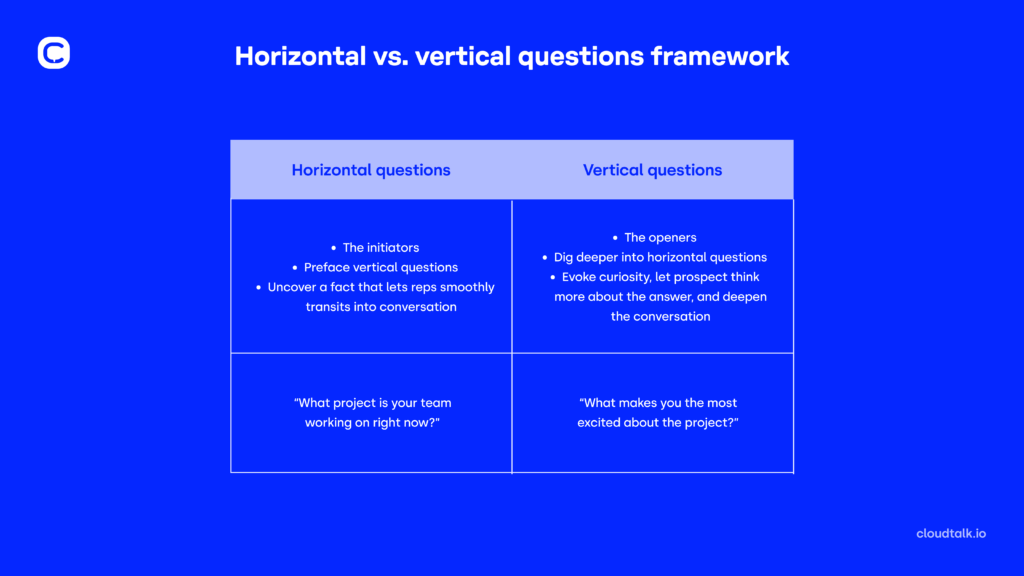
3. A Smart Talk Strategy, For All Who Hate Small Talk
We aren’t naive. We know that some salespeople outright despise small talk. So, for those out there who can’t stand it – stop talking small. Start talking smart!
The “Smart Talk” framework is inspired by a blog by Nancy Bleeke Noël, a President and Chief Sales Growth Consultant at Sales Pro Insider. It introduces 3 steps to making small talk more genuine.
1. Play Up Their Ego and Learn
People are egotistical by nature. We don’t mean to be, but who doesn’t love to talk about themselves? It’s easy and engaging, because it’s a topic we are intimately familiar with.
Just think, what would you rather talk about? The “All-Ireland hurling competition”, the most boring day in human history, or about your travels?
Actually, the most boring day is interesting, and statistics show that it took place on April 11th, 1954… but unless you are a historian, a peculiar sports fan, or just strange like us, we bet you’d prefer traveling.
The point is your reps should make small talk mainly about prospects and simply learn instead of taking over the conversation.
Instead of leading a lively discussion, agents simply pose a question that offers leads a space to talk about themselves and listen. Ideally, it should be something that they’re very passionate about.
An example:
“You studied in London, Jane. I love London! I wonder, what was that like?”
Your reps can also search for local news from the prospect’s surroundings and take inspiration from there.
2. “Tell me more”: Ask Follow-Up Questions
Once the prospect’s done describing the 5 amazing years they spent as a student in London, your rep should ask some follow-up questions. After all, nothing demonstrates a lack of interest better than embarrassing silence.
For example:
“Your studies sound really interesting. What was your favorite subject?”
If the follow-up question fails, nothing comes to the rep’s mind, or they, for some reason, didn’t catch what the prospect was saying, they can use this magical 3-word formula to save the day.
“Tell me more.”
Other examples of support questions:
- “What happened next?”
- “How did that make you feel?”
It gives the prospect permission to continue their story and gives the agent even more opportunities to learn more about them.
And here’s another great follow-up idea. Social psychologists recommend using the “admitting/feigning ignorance” strategy. Reps can turn the cards around, and instead of learning about prospects, they let the prospect teach them something.
The follow-up question here is simple: “I’ve never heard about that. How does it work?/What is it?”
This strategy makes the prospect feel smart, opens them up even more, and broadens your reps knowledge – a win-win! It’s important to mention that this strategy shouldn’t be used for topics the rep should know.
Interesting fact: seeking advice actually makes us look smarter.
If it goes against your reps’ competitive nature to admit they don’t know something, here’s a bit of science to show that it works:
Subconsciously, we often believe that asking for help shows us as incompetent. Well, Harvard and Wharton’s research proves us all wrong.
They conducted a series of studies where students were asked to solve brain teasers in couples. Some of them were told that they’ll be judged only on how accurate their answers are. Others were told that their success would be measured by how good of an impression they will make on their partner.
As you’d expect, the students in the first group asked for help more. And naturally, their project partners had higher opinions of these advice-seekers than they did of the individualists.
They figured that the people who asked them for advice must see them as clever, and that’s flattering.
4. Uncommon Commonalities, For Connecting Over Unexpected Discovery
Imagine that a salesperson (your rep) talks to another salesperson – the prospect. They probably both know a lot about sales, right? They can talk for hours about revenue optimization. But should they?
According to the Uncommon Commonalities framework, talking about something the rep and prospect have in common may not be enough to build a strong rapport. There’s nothing really new that can be revealed and nothing “shocking” to discover.
But what if they find out they are both Star Wars fans? That’s something unusual and creates a rapport around “unexpected discovery”.
Just like in this very spot-on TikTok video.
As David Burkus, the author of “Friend Of A Friend . . .: Understanding the Hidden Networks That Can Transform Your Life and Your Career”, wrote in his blog, these rare commonalities lead to what scientists call multiplexity – connections where there is an overlap of roles or affiliations from a different social context.
We prefer relationships with more than one thing to connect over. People seek multiplexity because these relationships tend to be more trusting, richer, and long-lasting.
So, when your reps will be researching a prospect next time, tell them not to be scared of unconventional topics.
Even a question like “Who’s your favorite superhero?” isn’t too crazy!
The 90 seconds are up: How can you wrap up small-talk smoothly?
You wouldn’t expect that ending a small talk requires preparation, but having a pre-planned exit helps reps avoid awkward silence.
They can use few proven lines to wrap things up smoothly:
- “This has been great, Jane. Thank you for telling me about (the topic).”
- “Can’t wait to hear how (the topic) goes. Let’s catch up on our next call.”
- “Glad we got the chance to connect over (the topic). I don’t want to steal more of your time, so let’s jump into…”
Selling Is All About Emotions, So Keep Calm And Smile!
Recently, Gong asked their network on LinkedIn what the hardest thing about selling virtually is. Of almost 2,000 people, 57% of them said it’s building rapport.
Why is winning someone over so difficult?
In the past, sales professionals believed decision-making is purely guided by logic. You learn a few phrases, present how amazing your product is, and you earn yourself a client.
But neuropsychology proved us all wrong. Selling, like all human interactions, is all about emotions. No matter how good a product you have, if you don’t win customers’ trust, you won’t sell much.
That’s why breaking the ice and building strong rapport is so important.
Here are a few last tips for your reps:
- Stay positive. No one likes negative Nancies,
- Use the prospect’s name (correctly),
- Never give yes or no answers, not even on closed questions,
- Smile even when calling. People can hear the difference.
And the most important of all – stay sincere. Show your reps this blog, tell them to walk in their customers’ shoes and use their common sense, and we guarantee you – everyone will fall in love with them.
Now, let’s finish this not-so-small talk with one of our closing phrases:
This has been great, guys. Thank you for staying with us to the end!












